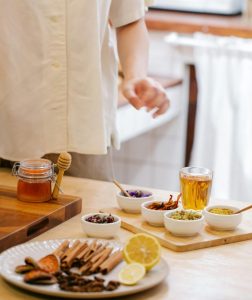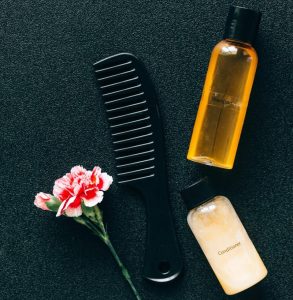If you’ve ever found yourself brushing white flakes off your shoulders or feeling self-conscious about an itchy scalp, you’re not alone. Dandruff affects millions of people around the world, and while there are countless commercial products on the market, many prefer home remedies for hair dandruff because they’re gentle, affordable, and effective. Dandruff is a common scalp condition that leads to flaking, itching, and irritation. It can be triggered by a dry scalp, excess oil, fungal infections, or even stress and diet. In this guide, we’ll explore what causes dandruff and why natural, at-home solutions are gaining popularity.
What Causes Dandruff?
Understanding the causes of dandruff can help you treat it more effectively. Here are the most common factors:
Dry Scalp vs. Oily Scalp Dandruff
While it may seem like dandruff is caused only by dryness, that’s not always true. A dry scalp can lead to small, white flakes and irritation. On the other hand, an oily scalp can encourage the growth of yeast, which causes greasy, yellowish flakes. Knowing the difference is key to choosing the right treatment.
Fungal Overgrowth (Malassezia)
A naturally occurring fungus called Malassezia lives on our scalp. When it grows out of control—often due to oil buildup—it can irritate the skin and trigger dandruff symptoms like flaking, redness, and itchiness.
Product Buildup and Sensitivity
Using too many hair products or shampoos with harsh chemicals can lead to buildup, which blocks hair follicles and irritates the scalp. Some people may also develop sensitivities or allergic reactions that mimic or worsen dandruff.
Lifestyle and Diet Influences
Stress, poor hygiene, irregular shampooing, and a diet low in zinc or B-vitamins can also contribute to dandruff. A healthy lifestyle and balanced diet play a crucial role in managing symptoms naturally.
Why Use Home Remedies for Hair Dandruff?
Many people are turning to natural remedies for dandruff because of their long-term benefits and simplicity. Here’s why home-based treatments are worth trying:
Cost-Effective and Easily Accessible
Home remedies often use ingredients already found in your kitchen—like coconut oil, lemon juice, or apple cider vinegar—making them a low-cost solution that’s always within reach.
Fewer Side Effects
Unlike chemical-laden shampoos, most natural treatments are gentle on the skin and less likely to cause irritation, making them ideal for those with sensitive scalps.
Nourishes the Scalp Naturally
Natural remedies don’t just treat dandruff—they also restore moisture, balance oil production, and improve overall scalp health. This creates a healthier environment for your hair to grow strong and dandruff-free.
Top 10 Proven Home Remedies for Hair Dandruff

Say goodbye to chemical treatments and hello to nature’s medicine cabinet. These top 10 proven home remedies for hair dandruff are easy to make, affordable, and packed with powerful ingredients to soothe your scalp, fight fungus, and banish flakes.
1. Coconut Oil and Lemon Juice
Why it works: Coconut oil moisturizes the scalp while lemon juice balances its pH and fights fungal infections.
How to apply:
Mix 2 tablespoons of warm coconut oil with 1 tablespoon of fresh lemon juice.
Massage into the scalp for 5 minutes.
Leave it on for 20–30 minutes, then wash with a mild shampoo.
Use 2–3 times per week.
2. Apple Cider Vinegar Rinse
Why it works: ACV restores scalp pH and kills fungus responsible for dandruff.
How to prepare and use:
Mix 2 tablespoons of apple cider vinegar with 4 tablespoons of water.
After shampooing, pour the solution over your scalp and massage gently.
Leave it for 5 minutes and rinse thoroughly with water.
Use once or twice a week.
3. Aloe Vera Gel
Why it works: Aloe vera soothes itching and reduces irritation with its anti-inflammatory properties.
Application guide:
Scoop fresh aloe vera gel and apply directly to the scalp.
Leave it on for 30 minutes.
Rinse off with lukewarm water or a gentle shampoo.
Use 2–3 times a week.
4. Baking Soda Scrub
Why it works: A natural exfoliator, baking soda helps remove dead skin and reduce flakiness.
How to use:
Make a paste using 1 tablespoon of baking soda and a little water.
Gently scrub your damp scalp for 2–3 minutes.
Rinse thoroughly with water (no shampoo).
Limit to once a week to avoid over-drying.
5. Yogurt and Honey Mask
Why it works: Yogurt contains probiotics that reduce inflammation, and honey hydrates and soothes.
Instructions:
Mix 2 tablespoons of plain yogurt with 1 tablespoon of raw honey.
Apply as a mask on your scalp and hair.
Leave for 30 minutes, then rinse with mild shampoo.
Use once weekly.
6. Tea Tree Oil Solution
Why it works: Tea tree oil is a potent antifungal and antimicrobial agent.
How to use safely:
Mix 5 drops of tea tree oil with 2 tablespoons of carrier oil (like coconut or olive oil).
Massage into the scalp and leave for 20 minutes.
Wash thoroughly with a mild shampoo.
Use twice weekly.
7. Neem Leaf Paste
Why it works: Neem is a powerful Ayurvedic herb known for its antifungal and antibacterial properties.
Preparation & application:
Boil a handful of neem leaves in water, let it cool, then grind into a paste.
Apply to the scalp and leave for 30 minutes.
Rinse off with water or herbal shampoo.
Use once a week.
8. Fenugreek Seed Soak
Why it works: Fenugreek seeds reduce inflammation and help control flaking.
Steps:
Soak 2 tablespoons of seeds overnight.
Grind into a paste the next morning.
Apply to the scalp and let sit for 30 minutes.
Rinse with lukewarm water.
Use once or twice weekly.
9. Onion Juice
Why it works: Onion juice has antimicrobial properties and cleanses the scalp effectively.
How to use without the smell:
Extract juice from 1 onion and apply it to the scalp using a cotton ball.
Leave on for 20 minutes.
Rinse with a lemon-infused shampoo to neutralize the odor.
Use once a week.
10. Lemon and Curd Mix
Why it works: Lemon cuts excess oil while curd moisturizes and soothes the scalp.
Mask prep & care:
Mix 2 tablespoons of curd with 1 tablespoon of lemon juice.
Apply the mixture to your scalp and leave for 20–30 minutes.
Rinse with a gentle shampoo.
Apply weekly for best results.
Lifestyle Changes to Support Dandruff Removal

While home remedies are effective, long-term relief from dandruff often requires adjustments in your daily routine. These lifestyle changes can help enhance results and prevent recurrence.
Hydration and Balanced Diet
A healthy diet for dandruff should include foods rich in zinc, omega-3 fatty acids, and B vitamins. Leafy greens, nuts, seeds, and fatty fish support scalp health. Drinking plenty of water also helps reduce scalp dryness and flaking.
Avoiding Harsh Shampoos
Many commercial shampoos contain sulfates, parabens, and artificial fragrances that irritate the scalp. Choose mild, sulfate-free shampoos and avoid over-washing, which strips natural oils.
Scalp Massage and Exfoliation
Massaging the scalp boosts blood circulation, encouraging healthy skin turnover. Use a soft brush or fingers to gently exfoliate dead skin cells, ideally once a week.
Managing Stress Levels
Stress can worsen dandruff by affecting hormone levels and weakening the immune system. Practice stress-relieving techniques like meditation, deep breathing, or regular physical activity to maintain scalp balance.
Common Mistakes to Avoid When Using Home Remedies

Even natural treatments can backfire if not used correctly. Avoid these dandruff treatment mistakes to protect your scalp:
Overuse of Acidic Ingredients
Too much lemon juice or apple cider vinegar can disrupt the scalp’s natural pH and cause irritation. Always dilute and use sparingly.
Not Patch-Testing New Remedies
Before applying anything new to your scalp, test a small amount on your inner arm to rule out allergic reactions or home remedy side effects.
Using Hot Water to Rinse Scalp
Hot water strips natural oils, leading to dry scalp and increased flaking. Always rinse with lukewarm or cool water.
Inconsistent Application
For home remedies to work, consistency is key. Skipping treatments or changing methods too frequently can reduce effectiveness.
When to See a Dermatologist
While home remedies can resolve mild to moderate dandruff, some situations require professional help.
Signs of Infection or Worsening
If you notice pus-filled bumps, intense itching, or bleeding, you may have a scalp infection that needs medical attention.
If Home Remedies Show No Improvement
Persistent dandruff that doesn’t respond to natural treatments after 3–4 weeks may indicate a more serious condition like seborrheic dermatitis or psoriasis.
Red Patches or Hair Loss
Red patches, bald spots, or excessive hair loss alongside flakes can signal an underlying skin disorder. In such cases, consult a dermatologist for severe dandruff treatment options like medicated shampoos or topical steroids.
Frequently Asked Questions

Here are clear, concise answers to the most common queries about home remedies for hair dandruff:
Q1: What is the fastest home remedy for hair dandruff?
The apple cider vinegar rinse is one of the fastest remedies. Its antifungal and pH-balancing properties can reduce flakes and itchiness within a few uses.
Q2: Does lemon juice remove dandruff permanently?
Lemon juice helps control dandruff by balancing scalp pH and reducing fungus, but it’s not a permanent cure. Regular use and lifestyle changes are needed to prevent recurrence.
Q3: How many times a week should I use home remedies for dandruff?
Most remedies can be used 1–3 times a week. Consistency matters more than frequency—avoid daily use unless it’s a mild remedy like aloe vera.
Q4: Which oil is best for dandruff and itchy scalp?
Tea tree oil (when diluted) and coconut oil are highly effective. They soothe itchiness, fight fungus, and moisturize the scalp naturally.
Q5: Can aloe vera cure dandruff naturally?
Yes, aloe vera has anti-inflammatory and antifungal properties. It can reduce dandruff naturally over time, especially when used regularly and alongside other remedies.
Q6: Is it okay to leave coconut oil on scalp overnight for dandruff?
Yes, leaving coconut oil overnight can deeply moisturize the scalp and reduce flakiness. Just ensure it’s rinsed out properly the next morning.
Q7: What causes dandruff to worsen?
Common triggers include stress, poor diet, infrequent washing, harsh hair products, and fungal overgrowth. Not addressing the root cause can make dandruff worse.
Q8: Can diet affect dandruff severity?
Absolutely. A diet low in zinc, B vitamins, and healthy fats can increase dandruff severity. Eating nutrient-rich foods helps promote a healthier scalp.
- 7+ Proven Home Remedies for Sneezing That Actually Work - August 2, 2025
- 10 Natural Remedies for Eczema Relief - June 5, 2025
- How to Clean Pool Table Felt Without Damaging the Surface - May 9, 2025

